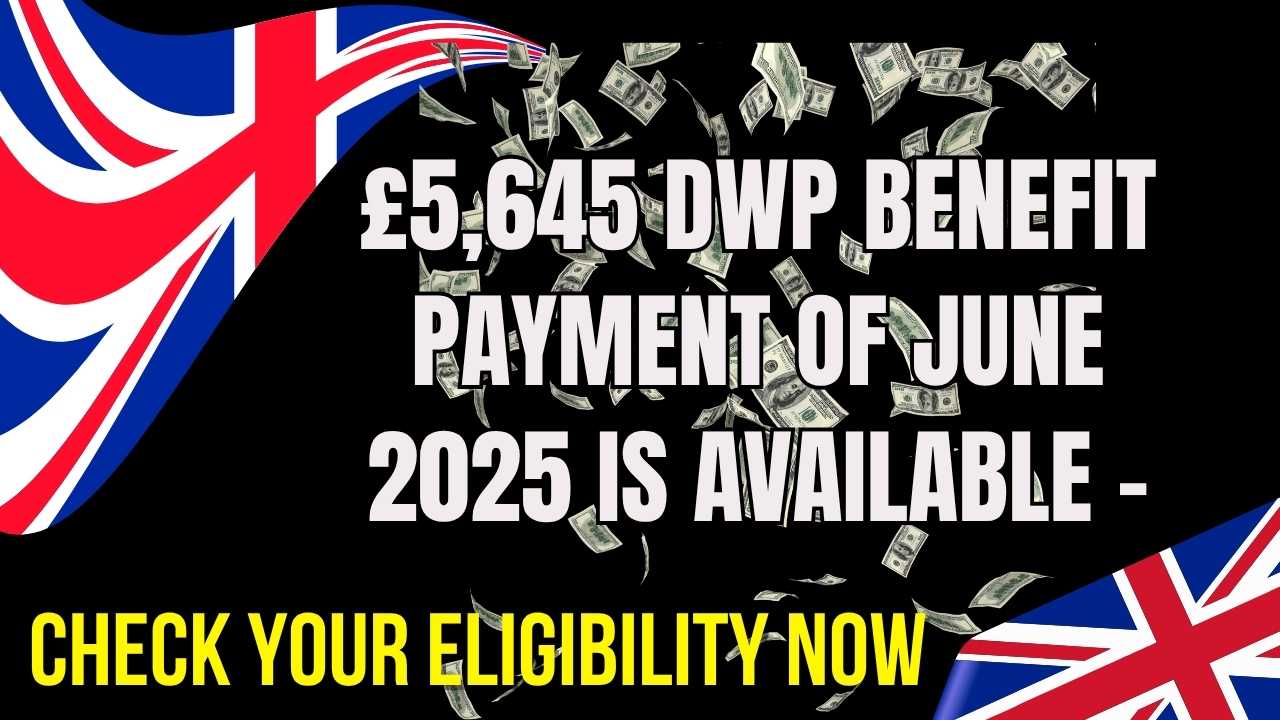The Department for Work and Pensions (DWP) plays a vital role in supporting millions of UK residents through a range of benefits tailored to different life situations—be it unemployment, disability, retirement, or caregiving duties. With the rising cost of living, understanding how the DWP operates and the types of help available is more important than ever.
This DWP Benefit Payment guide sheds light on the comprehensive support system available in June 2025, including a special payment of £5,645. We’ll break down eligibility, benefit categories, application processes, and essential rights and responsibilities to help you navigate the system with confidence.
DWP Benefit Payment: Key June 2025 Support
The DWP Benefit Payment for June 2025 offers vital assistance to individuals and families facing financial pressure due to rising costs. This payment, including the one-off £5,645 support, is part of a broader benefits system managed by the Department for Work and Pensions to provide help based on personal needs and eligibility. Whether you’re claiming Universal Credit, ESA, or Pension Credit, staying informed about benefit updates like this ensures you receive the right financial support at the right time. Knowing how and when the DWP Benefit Payment is processed can make a significant difference in managing essential expenses such as rent, food, and utility bills.
Overview Table – June 2025 DWP Benefit Payment
| Benefit/Support Type | Purpose | Payment Style |
| Universal Credit | Combines multiple legacy benefits for working-age adults | Monthly payment |
| Personal Independence Payment (PIP) | For daily living or mobility due to disability | Bi-weekly or monthly |
| Employment and Support Allowance (ESA) | Support for those unable to work due to illness | Income-related or contribution-based |
| State Pension & Pension Credit | Financial support for pension-age individuals | Weekly or four-weekly payments |
| Tax Credits & Child Benefit | Helps families with children or low-income working households | Monthly |
| Carer’s Allowance | Support for individuals caring for disabled persons | Weekly payments |
| One-off June 2025 Payment | Additional £5,645 support | One-time bank deposit |
Overview of DWP Benefits System
The DWP manages the UK’s social security framework, offering financial aid across key circumstances. Its goals are twofold: provide a safety net and encourage users to move toward self-sufficiency, especially through work. Benefits are generally split into:
- Means-tested benefits, such as Universal Credit, based on household income and savings.
- Non-means-tested benefits, like PIP, based on personal circumstances or National Insurance contributions.
- Universal benefits, including Child Benefit, accessible regardless of income.
Recent reforms have seen Universal Credit replace several legacy systems to better accommodate fluctuating life situations.
Universal Credit
Universal Credit is the cornerstone of working-age support, combining prior benefits like Jobseeker’s Allowance and Housing Benefit into a single monthly payment. It supports those:
- Unemployed or in low-paid work
- Unable to work due to illness or disability
- Caring for others
Entitlement varies depending on factors like household income, ages, children, and housing costs. Earnings are partly disregarded to encourage work, reducing the benefit gradually. The housing component helps cover rent within local allowance rates.
Personal Independence Payment (PIP)
Designed for individuals with long-term disabilities or chronic illnesses, PIP is split into two components: daily living and mobility. Awards are based on how conditions affect everyday tasks and movement, rated at administrative levels and reviewed periodically to ensure ongoing eligibility. PIP is non-means-tested, so financial status does not affect entitlement.
Employment and Support Allowance (ESA)
ESA offers support to people who cannot work due to health issues. There are two versions:
- Income-related ESA, for those with low incomes.
- Contribution-based ESA, for workers who have paid enough National Insurance.
Eligibility is decided through a Work Capability Assessment, categorizing claimants into support or work-focused groups, which determines payment level and support offered.
State Pension and Pension Credit
The State Pension provides income for those reaching pension age, depending on years of National Insurance contributions. Individuals eligible after April 2016 receive a flat-rate amount, topped up for additional qualifying years. Pension Credit boosts incomes for those on low retirement incomes and may include extra support for disabilities and housing costs.
Child Benefit and Tax Credits
- Child Benefit supports families with children under 16 (or under 20 in full-time study) and is not means-tested but may be subject to a high-income tax charge.
- Working Tax Credit and Child Tax Credit help low-income families with children or work commitments but are being phased out in favor of Universal Credit.
Carer’s Allowance
This provides additional support for individuals caring for someone at least 35 hours a week who is receiving disability benefits. Applicants must meet residency, income, and education requirements. Payments underscore the DWP’s recognition of informal carers.
Application Processes
Most benefits can be applied for online, by phone, or via paper forms. Requirements include personal and financial information and, where relevant, medical reports. Submission speed and accuracy are essential to prevent delays. Urgent requests may be fast-tracked, while assessments (like PIP) may take several months.
Payment Methods and Timing
Benefits are paid into bank, building society, or credit union accounts. Payment timing depends on the benefit—working-age payments are monthly, while pensions may be weekly or every four weeks. Bank holidays may alter payment dates, but DWP provides schedules ahead of time.
Rights and Responsibilities
Claimants have the right to get fair, timely decisions and accurate payments. At the same time, they must report changes in address, income, or circumstances. Discrepancies can be reviewed via mandatory reconsideration, with appeals possible through independent tribunals if needed.
Staying Informed and Avoiding Scams
Always rely on official sources—GOV.UK, DWP publications, or reputable advisors. Be cautious of fake websites or unsolicited calls claiming to offer help. The DWP never asks for payment or sensitive data via unexpected communication.
Conclusion
The DWP Benefit Payment system spans a variety of support mechanisms designed to help individuals through varied life stages and challenges. The standout £5,645 one-off payment of June 2025 may offer much-needed support, but awareness of eligibility and proper application is key. By understanding available benefits and adhering to responsibilities, UK residents can access the right help when they need it while preserving the integrity of the social security system.







